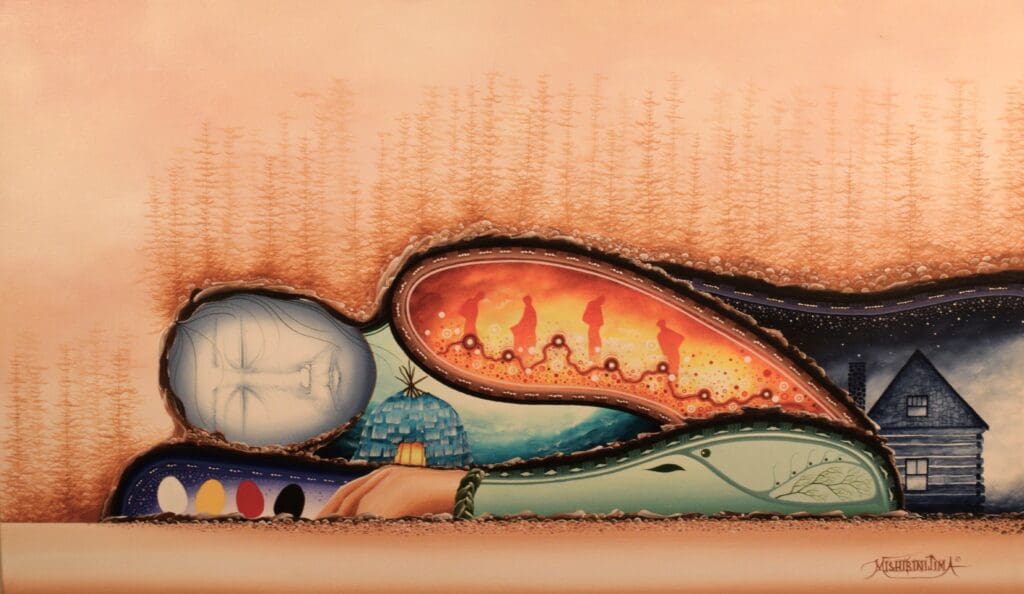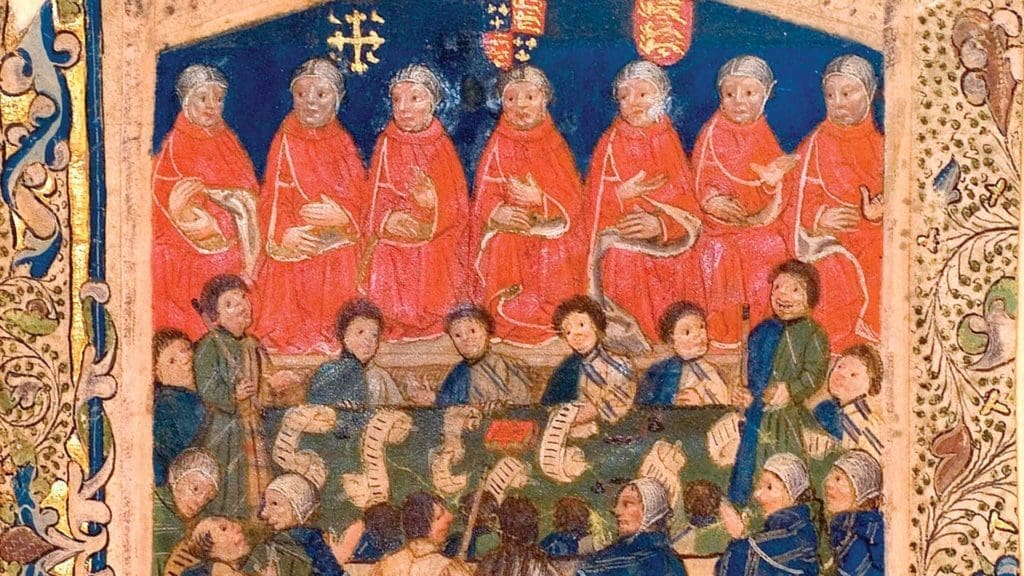I
It is not quite fair to claim the 1938 film Holiday has never found its audience—any movie still being watched eighty-five years after its release must have at least some fans—but it does have an oddly lukewarm reputation for a supposed classic. It is sometimes lumped together with the screwball romantic comedies of prewar Hollywood like It Happened One Night or His Girl Friday, movies that are wacky and worldly-wise and usually full of a robust sexuality just barely blurred into something unobjectionable by the speed at which they unfold. Holiday, on the other hand, was written for the stage a decade earlier; its rhythms are more stately and mannered, and it contains not one innuendo—indeed, its romantic leads behave as if they had never gotten the facts of life entirely straight. Already it was a little out of time. Perhaps that’s one reason it flopped with contemporary audiences (another is that the Independent Theatre Owners of America had just placed its leading actress, Katharine Hepburn, on a now-infamous list of “box office poison”). Pauline Kael damned it with faint praise: “Cary Grant manages to make a likable and plausible character out of a dramatist’s stratagem.” Even the essay accompanying its Criterion Collection release focuses on the careers and personas of its stars, hardly touching the actual film.
And yet I think Holiday does have a ready audience—it is a movie I often recommend around this time of year to people who have a difficult relationship with their family, who feel something less than unmixed joy about travelling home for Christmas (for Holiday is, yes, a holiday film). It works for this purpose because it’s not an especially great romantic comedy, certainly not when stacked against the best of its day. (It’s not even the best Hepburn-Grant movie of 1938: the immortal Bringing Up Baby was released four months earlier.) It doesn’t teach us much about what people in love are like, and while it does have some good laughs, they’re more genial chuckles than gut busters. But that might, in the end, work to the film’s advantage. Because we aren’t laughing nonstop, and because we don’t fully invest in the lovers, it’s easy to tune in to other aspects of the film, such as that it’s actually very sad, almost tragic; in fact, I cry every time I watch it—but more about that later. If there is greatness in Holiday, if it has anything to teach us, we have to entertain the possibility that it might misunderstand itself; we are going to have to read it a little against the grain. We might start by noting that its romantic leads are not the central relationship at all. That honour belongs to two siblings, sister and brother.
But a brief summary is in order. Johnny Case (Grant) has worked himself up from poverty into a promising business career. He’s just returned to New York from a ski vacation where he met, courted, and became engaged to Julia Seton (Doris Nolan). Now he has a date to meet her family, but the address he’s been given belongs to a Fifth Avenue mansion—Julia, it turns out, is “one of those Setons,” the daughter of a tycoon (the exact nature of the Seton fortune is never explained), and she thinks Johnny has it in him to found a dynasty of his own. Johnny is a little wary of attaching himself to such wealth—his big idea is to take a delayed Wanderjahr, to quit for a while and “come back when I know what I’m working for . . . find out who I am and what goes on.” (It’s a half-baked idea, even Johnny admits. What’s important is the way each of the Setons reacts to it.) His suspicion deepens as he gets to know Julia’s father and siblings—lugubrious, alcoholic brother Ned (Lew Ayres) and bohemian manqué sister Linda (Hepburn)—each of whom is a case study in the fearsome diversity of ways money can stunt a life. Most of the film takes place in the one human-sized room in the Seton house, a playroom built for the three siblings by their late mother. As Linda shows Johnny around the playroom in an early scene, we learn she is deeply attached to it, for it represents not only her mother but also the thwarted possibilities of childhood and adolescence. The room becomes a sort of Rorschach test for the film’s characters; we can judge them by how they feel and behave inside it.
It’s obvious to us what will happen to Johnny: he’s going to wind up with Linda, because she’s played by Katharine Hepburn. Moreover, she thinks his plan is great—she’s also been engaged in a project of self-discovery (“I could never decide whether I wanted to be Joan of Arc, Florence Nightingale, or John L. Lewis”), and she’s looking for a chance to get out of town. Johnny, for his part, is immediately charmed by the playroom. Their coming together is a foregone conclusion, but Linda doesn’t see it that way. She spends the first part of the movie trying to convince her father that Johnny is the right man for Julia, then tries to convince Julia of the same after the couple argues over their future. Linda does this because, she insists, she loves her sister. She can’t, or won’t, admit that she herself has fallen for Johnny until she sees he is at a moment of crisis, and even then she doesn’t tell him. It is to her brother Ned alone that she confesses, because Ned asks her to, and he asks because he has already discerned the answer. And although he is so drunk he will fall asleep at the end of the scene, he knows Linda well enough to see she needs to hear herself say it.
Moments like this are what make Holiday Ned and Linda’s movie. Their scenes together carry an outsize amount of plot and character development, and are the most moving parts of the film. In these brief passages, Hepburn and Ayres convincingly portray the deep understanding that comes from decades of intimacy. (Holiday is worth watching for Ayres’s perfect performance alone, a marvel of Old Hollywood character acting.) I am particularly fond of a wordless bit of business near the end where Ned attempts to sneak away from a confrontational moment. As he passes by Linda, she reaches out, grabs his jacket, and pulls him down to sit in the same chair as her—she needs him by her side to get through what’s coming. Their relationship is part of why Holiday doesn’t feel like a romance; the movie settles around them because there is a gravity to their love that Linda and Johnny, for all their affinities, simply haven’t had time to develop. It is something richer than sibling love (which after all is rooted in the accident of genetics); theirs is a camaraderie born of mutual frustration.
Frustration with what? One way to answer that is to contrast the siblings. Linda loves Julia too, and claims to do so fiercely. And Julia professes to love her back: “It’ll be awful to leave you,” she says, embracing Linda after telling her of the engagement. But long before the end of the movie we come to see an asymmetry in their relationship. Linda doesn’t understand Julia but thinks she does; Julia is equally ignorant of certain aspects of her sister (foremost that Linda is in love with her fiancé) but does comprehend that one fact. Their affection plays out under false pretenses, exactly the opposite of Linda and Ned, who see each other plainly and can tell each other the truth without fear of giving pain. As for Mr. Seton, he is never cruel to Linda, never denies her any material comfort, but he is alternately baffled by and condescending to her. “Linda has many generous impulses,” he tells Julia. “I think you and I know how to take care of those ideas.” He is in fact perpetually ordering around all of his adult children; his essential problem is that he wants them to appear respectable but does not himself respect them.
Holiday reminds us that sometimes, even where there is no animosity or abuse, you may not be able to count on your family for understanding, encouragement, honesty, or respect.
This is how the movie pushes us up against the limits of family. Home may well be the place where, when you have to go there, they have to take you in, but shelter is a relatively low bar for love. Holiday reminds us that sometimes, even where there is no animosity or abuse, you may not be able to count on your family for understanding, encouragement, honesty, or respect. There’s no guarantee they’ll even like you. The chemistry of affection is capricious; as for the rest, one has to choose to offer those things to another, whether kin or not.
Consider how Linda loves Ned and Johnny in the same way, or as two faces of the same kind and quality of love. Her fears for them are the same: that they are failing their human potential, that money will blunt them into someone smaller and coarser than they ought to be. One could say she sees Johnny as part of the family, but that’s not it, not given how she relates to her father and sister. No, Ned and Johnny are something else to her. With the fierceness of her love and the purity of her vision she has promoted both men beyond their natural stations of mere family, mere paramour. We name this type of love “friendship,” and Holiday suggests that it is a higher calling than familial or romantic bonds.
Here I am using a very old definition of friendship, old enough to have been pithily expressed by the twelfth-century Cistercian abbot Aelred of Rievaulx. Taking an even older page from Cicero, he defines friendship as “mutual harmony . . . coupled with benevolence and charity.” Benevolence, for Aelred, refers to “love which is pleasantly roused interiorly”—that is, the natural, unprompted affection we feel for the beloved. Meanwhile charity is a blanket term for the conscious actions we take to care for each other. The Christian, after all, is commanded to love everyone—which Aelred concedes can be a chore. Friendship, then, is the blessed case where we already like the person we are obligated to love, the rare occasion when emotions, intellect, and will all work in harmony.
The finest depictions I know of this vision of friendship are found in the novels of Jane Austen. All of Austen’s heroines come from families whose love is compromised at best, but the clearest examples are in her last two books, Emma and Persuasion. Emma’s father is one of those quiet tyrants whose solicitousness for others is a way to stage-manage the world into assuaging his fears. To use Aelred’s terms, he is benevolent toward Emma (he is affectionate in his way) but not charitable; he is not willing her good, as the theologians say, and so his immaturities and hers are mutually reinforcing—Emma will not be able to develop morally until she can get away from him. Meanwhile poor Anne Elliot of Persuasion is stuck being the only mature one in her family. She seems beneath the notice of her vain and snobbish father, while her two silly sisters prevail on her to make any decision more difficult than what to have for breakfast. Anne is all charity, performing the right action at every turn, without much benevolence; she loves her family dutifully but cannot respect them. Neither Emma nor Anne are well-understood by their families, and they never will be. There is a bittersweetness to their endings because, while they find joy, it cannot be shared fully with their nearest relations.
As compensation, Austen gives each of these two a network of friends who fill the role a more functional family might serve, acting as confidants and confessors, providing comfort and sympathy, and in Emma’s case moral formation. It is these friends who are able to celebrate fully with the heroines at their marriages—and, crucially, their husbands fit right in with the gang, or were perhaps always part of it. In Austen there is a hierarchy of marriages, from the dysfunctional to the merely functional to the most blessed kind that can only exist between true equals, where benevolence and charity are both present in full measure—where husband and wife are, in other words, friends.
There is an ad hoc family in Holiday too, in the form of Johnny’s close friendship with Susan and Nick Potter (the great character actors Jean Dixon and Edward Everett Horton). The Potters are intellectuals and academics, interested in culture and disdainful of wealth, and the film intimates their political sympathies may be just a little bit radical. They function as spiritual parents to Johnny (who is an orphan) and have helped him materially as well: Johnny seems to have lived with them for some part of his adult life. The Potters are the first to hear of his engagement to Julia, and they are his first call when it falls apart. We suspect their influence behind his plan to quit work, and in the way he remains grounded and cautious rather than becoming dazzled by the Setons’ money. When he does briefly fall under its spell, it is the Potters who are able to see the correct way to chastise him—humour—and he immediately understands and accepts their gentle correction. “The marble pillars got me,” he confesses, walking a mock gantlet in which his friends administer justice in the form of kicks to the seat of his pants.
Those kicks are one of friendship’s gifts, its ability to remove our illusions about ourselves without a fight, disarming our natural defensiveness by being gentle, even funny. Received in the right way, from someone who loves you, the painful work of growth can be part of a game. The Potters’ jokes and kicks operate much the same way Ned is able to elicit Linda’s confession that she loves Johnny: he is patient and indirect, and lets her come to the conclusion herself rather than confronting her directly, as Julia does.
Regarding our friends, we see there is always more to the world, and so we are seduced into an open stance toward it; we are inoculated against solipsism.
But if our friends give us a new vantage point from which to see ourselves, they also give us a fresh view onto the world outside our head. In Aelred’s formulation, a friend is the neighbour it is easy to love, someone we are not threatened by but instead take in with interest and delight. Regarding our friends, we see there is always more to the world, and so we are seduced into an open stance toward it; we are inoculated against solipsism. This too is dramatized in Holiday. Observe how the film sorts its characters by their comic method. Johnny and the Potters joke with each other by taking on personas—that is, by constantly leaving themselves and adopting new perspectives: now a scolding schoolmarm, now a social grandee, and so on. They don’t have to explain their premises (“For the purposes of this retort, imagine I am . . .”) but trust each other to understand. Linda jokes this way too; she does it with Johnny at their first meeting, and so we are in no doubt she will fall in with his crew and end up with him. They speak the same language; they share the same capacity to pretend, to play (the key word of the movie). This play as much as anything forms the boundaries of their group: if you get the joke, you’re in; and if you take the bit seriously, we know we can’t trust you with more important things.
By now it shouldn’t surprise us that Linda’s family fails this test. Both Julia and Mr. Seton are in fact often telling Johnny or Linda to be serious. The one real joke in the film that Julia truly laughs at is a simple prank—a kind of humour that depends on withholding sympathy from its object. Mr. Seton seems unable to joke at all; he can only emit gassy false laughter after a declaration, in the manner of powerful people who are convinced that talking to them must be delightful. Ned can joke, but only by cracking wise. He has lost the ability to play like his sister; he is stuck as himself, or rather he can only set himself aside through alcohol, which for him becomes a kind of substitute imagination (he describes getting drunk as “a terribly exciting game”).
Ned sits in between the two camps, and so we locate the film’s tension in him. It won’t resolve. Linda will, after saying her piece to father and sister, leave the Seton mansion and very literally sail away with Johnny, but Ned will remain among the marble pillars. As she is leaving, Linda embraces him and asks what we all wonder: will he go with her? Out of the question, declares their father. “Can’t,” says Ned. “Caught?” asks Linda. Ned nods: “Maybe.” Their mutual understanding is such that there is hardly need to say anything else, but Linda makes a promise. “I’ll be back for you,” she says, and Ned softly, almost apologetically replies, “I’ll be here.” It is a moment that never fails to leave my cheeks wet. The film has one more short scene to play out, the inevitable coupling of Linda and Johnny, but it feels perfunctory and unsatisfying. We are glad to see the lovers unite, but our hearts are still with Ned.
Understood only as a romantic comedy, Holiday must, by its end, be regarded as a failure. The bittersweetness it leaves us with is a clue that something else is going on. So too is the fact that Holiday, unlike nearly every other romantic movie of the era, does not end with the lovers drawing a curtain or closing a door to shut the world (and the audience) out of their bliss. Linda and Johnny’s concluding kiss takes place in public, in a ship’s corridor. It is the Potters—who are travelling with them—who shut the door, retreating to their cabin to give the lovers a moment, knowing the couple will soon walk through it to inaugurate their relationship as part of a community. This happy ending among friends, along with Ned’s unhappy one at home, makes us feel that romance and family are not, strictly speaking, sufficient for the good life; unsweetened by the benevolent charity of friendship, they are only passion, only duty. Holiday’s pairs—lovers who are friends and lovers who aren’t, siblings who are and siblings who aren’t—demonstrate what that sweetness adds to a life. The movie’s great thesis is the same as Austen’s, and Aelred’s for that matter: all relations aspire to the condition of friendship. Throw it on if this week finds you feeling alone among family, seeking real understanding and warmth—may it provide some measure of comfort and laughter. And may this holiday season bring you ample time among those who know you best, who are family in all but name.






